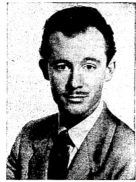
Tex Antoine 1956
Tex Antoine combined a warm, friendly personality with talents as a cartoon artist to make himself the most popular weather forecaster in New York City for nearly 30 years. He won an Emmy for best local on-air personality in 1961, met his wife through his work in 1964, and eventually became an inspiration to the generation of weather forecasters who followed in his footsteps. In 1974, after 25 years doing TV weather, he was honored with a ten minute on-air video chronicling his work. Then in 1976, he made a shocking remark on the air and his career never recovered. The comment, a joke about rape, has not been forgotten by many. I wanted to try to understand the man who was so popular for so long, look at the remark that brought him down, and ultimately make sense of this man’s legacy.
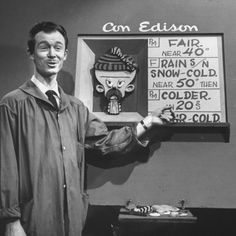
Tex Antoine and Uncle Weathbee
Growing Up
Herbert Jon Antoine, Jr. was born in Evanston, Illinois, in 1923. His father was a traveling salesman who, according to Tex, tried to sell everything he could but had little success doing it. His mother was a teacher who could always be seen with school books by her side. Tex said he and his family were poor; they spent the depression living out of a Franklin Touring car on the side of the road. He went to high school near Houston, Texas. While he was at a summer theater internship in Plymouth, Massachusetts, he discovered a love for the stage and the theater that would drive him to want to work in show business. He also was a boxer in his youth. His ex-wife Suzannah Glidden said he was very proud of his time in the Golden Gloves program. She explained that one of the fighting competitions was what first brought Tex to New York.

Tex’s Lynbrook House
New York
Antoine started in the Big Apple as a tour guide for NBC in 1941. Within a year, he auditioned for and landed a full-time position as an NBC station radio announcer. By 1945, he was taking part in a three person on-air news team in the morning, announcing for a soap opera during midday, and reading commercials and fill-in spots for the rest of the day. He continued on as an announcer for many years after he started doing the weather. Tex moved into a four bedroom house in Lynbrook, Long Island, and made many island area public appearances until the 1960’s when he got married. Many of those appearances were charity drives to fight diabetes, from which he suffered.
Television was in its infancy in the 1940’s as the industry had just begun migrating from radio to screen. On radio, a weather forecast could simply be read from paper, whereas TV required more visual presentation to work. Robert Henson, weather historian and author of Weather on the Air, writes, “The visual nature of television demands action in the form of weather maps and people who could explain them.” TV’s first weathermen were primarily military veterans and college professors because they were the only people who could provide any level of detail. As television audiences grew, stations looked for ways to make the weather more entertaining.
According to interviews, Antoine was approached in January 1949 by his bosses at NBC. They told him on a Thursday that he was going to be their new TV weatherman and to have a show ready for the next Monday. He was told to go to the weather bureau, learn as much as he could, and be ready to go when the cameras started rolling Monday. Luckily Tex had his talents as an illustrator. Ms. Glidden described him to me as a “magician with a pen.” He could draw anything and do it quickly; then with a few more seconds, morph what he had just drawn into something else.
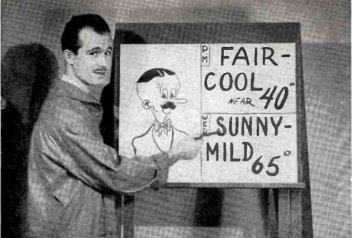
Tex on the air in 1949
In preparing, Tex also created a wooden shaped stick figure character to go on the air with him as a sidekick. He said the inspiration for the character came from his days as a child in the south. He recalled a toy which allowed for magnetic attachments like ears, a hat, and a mustache. Tex said the name Uncle Weathbee came while en route to the weather bureau. The idea was the character and the bureau would save Tex from blame if a forecast went wrong. Antoine could say Weathbee, in effect the Weather Bureau, was responsible for the incorrect forecast. He would affix a black eye to Weathbee when the forecast was embarrassingly bad.
He put on a smock to merely protect his clothes while doing the weather. But the smock turned out to be a great finishing touch. It made him appear as much artist as weather forecaster. The introduction for his premiere show in the January 15, 1949 New York Times read, “WNBT will start a new daily series of weather reports with an artistic flavor featuring Tex Antoine, announcer, beginning Monday from 6:25 to 6:30. Mr. Antoine, an amateur cartoonist, will give a complete round-up of weather conditions in the metropolitan area and then sketch his impressions of this report.” (WNBC Channel 4 in 1949 went by the call letters WNBT).
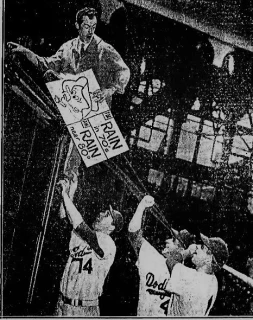
Gil Hodges, Andy Pafko, Peewee Reese protesting rain forecast in 1952
Tapping into his announcing skills, Tex came across as soft spoken and friendly, while his drawings made weather fun. Critics and viewers were impressed. New York Times writer Jack Gould wondered if Tex should be on the air more and said he liked his dry and witty humor. Sponsor Con Edison quickly capitalized on Antoine’s popularity with ads that looked like a column written by Uncle Weathbee which included often not so subtle suggestions to buy washing machines, refrigerators, and air conditioners throughout. Tex was especially popular with kids, and so coloring books and almanacs were published featuring Uncle Weathbee. Tex was given an additional five-minute slot at 11:10 PM. By the mid 1950’s, Antoine was firmly established as the most popular weatherman in New York City.
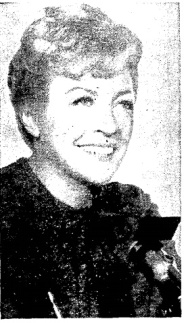
Carol Reed
Competition
Hiring attractive women to do the weather was something other area stations had tried, but it seemed to become a requirement in the late 1950’s by stations aiming to compete with Tex in ratings. By 1960, every station had a lead woman forecaster (or “weather girl” as they were called at the time) except for WNBC and Antoine. Then Vice President at WABC Joseph Stamler explained the rationale of the weather girl:“We feel that women–or ladies–have greater acceptance than men, because with the combination of an attractive looking personality the men prefer to look at and the women are attracted, too, because of the fashions they wear, so we’ve really got a twofold program.” Tex’s manager at NBC Peter M. Affe contended by saying, “Our first concern in the presentation of our weather shows is the effectiveness and accuracy of the forecast.” Whether Tex’s forecasts were more accurate or not, he prevailed in the ratings and the other stations eventually moved away from women leads. When Carol Reed was let go by CBS TV in 1964, it marked the end of the “weather girl” era.
Marriage, Changing Channels
When it came time to renew his contract in 1966, Tex found channel 7 WABC expressing strong interest in his services. ABC always lagged behind both Channel 4 and Channel 2 in the ratings and was looking for a way to catch up. Tex turned back to NBC to see if they would counter with a better offer, but they chose not to. WNBC had a trained meteorologist on staff who was a familiar face with the public, science reporter Dr. Frank Field. Tex found the difference in salary too much to pass up, and so in March after 17 years with channel 4, Antoine became the new weatherman for WABC Channel 7 News.
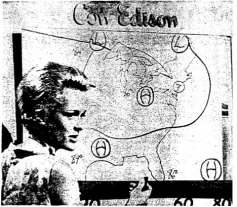
Suzannah Glidden in 1966
There was another attraction for Tex at ABC: his wife worked there. Antoine had just married reporter and former weather girl Suzannah Glidden. They had met while both were researching their forecasts at the weather bureau and married in 1965. It was Tex’s second marriage. He had been married for a short time when he first came to New York and already had an adult daughter Nancy.
While working with his wife and getting more money was great, Tex was also leaving the one station he had called home for 17 years. Channel 7 was trying to catch up in ratings after having lagged behind for years. The station would soon hire news manager Al Primo and bring in a format later referred to as “happy news,” in which on-air staff were encouraged to be more jovial and edgy. Antoine’s lively personality seemed to make him the perfect fit, though it would one day also be blamed for his future incident. New York Magazine’s Paul Klein called Tex’s move to channel 7 a watershed event in local news.
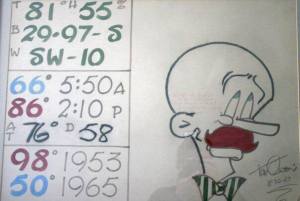
1967 Antoine drawing, courtesy of Ted David
Signs of Trouble
Primo asked all on-air staff members to wear blazers, which meant the end of Tex’s signature smock. When Antoine protested, Primo said to Tex, “Either we all wear blazers or smocks,” and the smock was gone. Uncle Weathbee seems to have diminished from his routine at about the same time. It all meant Tex would have to rely more on conversation and less on his customary drawings and props.
Tex suffered from diabetes, and as Primo explained, it made Tex harder to understand, especially when combined with alcohol. Primo said Tex was a creature of habit, that he would go to the same German restaurant each night and have a glass of wine, sometimes two, between the 6:00 and 11:00 PM shows. Ms. Glidden explained that he needed two insulin injections daily to deal with his diabetes. The diabetes, the change in environment took a toll on Tex, and he and Glidden divorced in the early 70’s.
In 1972, Antoine made a comment on the air during the Munich Olympic hostage crisis stating that more attention should be paid to the many lives lost in U.S. traffic accidents rather than the hostages. It came off as insensitive and Tex had to apologize for it. In 1974, at his 25th anniversary party, he yelled at fellow reporter Ron Johnson to get the f-word out of the way because he couldn’t see his cake. A rookie sound producer working that night didn’t turn off a live microphone and so it was caught on the air. Tex was having trouble keeping up with the workload. He gave up the 11:00 PM slot to focus on just the 6:00 news show.
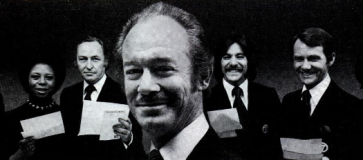
Backed by Melba Tolliver, Roger Grimsby, Geraldo Rivera and Bill Buetel, 1973
Despite it all, Tex remained popular through the mid 70’s. The New York Times in 1973 described his audience as awestruck fans that had grown up following his forecast for years. Discover magazine observed that Antoine had a unique “almost jazzlike patter” which naturally drew listeners in to him. Craig Allen, now lead meteorologist on WCBS radio, remembered a visit from Tex to WSNL Long Island in 1974. Allen said he was “genuinely polite and friendly to fans, namely me.” Ted David, veteran CNBC broadcaster, knew Tex well when he was a page at WABC. Ted said Antoine was a gentleman, had a great voice, and was an all around good guy. There always seemed a bright side to Tex, but he was heading towards his darkest moment.
November 24, 1976
The Wednesday before Thanksgiving on the news at 6:52 PM, anchor Bill Beutel reported the attempted rape of an eight-year-old Yonkers girl, gave a stock market report, then handed off to Tex for weather. Antoine said, “With rape being so predominant in the news lately, Confucius once say if rape is inevitable, relax and enjoy it,” and continued to the weather. Once the words escaped his mouth, things would never be quite the same.
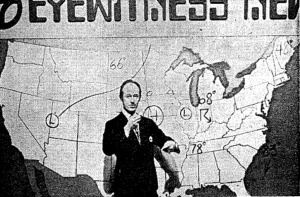
Doing weather in 1973
TV critic and author Peter Conrad pondered in The Medium and Its Manners if Tex somehow thought it was his professional obligation to be “as comically resilient about the assault as he always was about the weather.” Weather historian Robert Henson pointed out that the “relentless emphasis on high jinks and humor” helped create the atmosphere in which Tex would try to tell such a joke. Newspaper columnist Jack Anderson wrote that the broadcast on the same day also included an edgy Liz Taylor joke, a double entendre about keeping fresh Thanksgiving items, and several other similarly objectionable quips. But the comment could not be ignored, particularly with women’s groups. Author Ron Stokes wrote in his 2010 book of remembrances, “I guess Old Tex didn’t get the women’s lib memo that was circulating at the time.” Rape and humor were not good topics to mix, and to make things worse for Antoine, the report was about an eight-year-old girl.
While WABC went to commercial, news and public affairs director Ron Tindiglia called the studio from home and insisted that Tex immediately make an on-air apology which he did. “If I offended you with the Confucius saying, I apologize,” Tex said and finished his weather report. In the next 25 minutes, according to the station about 650 irate people called to complain about the remark. At 11:00 Grimsby announced Tex had been suspended indefinitely. Storm Field was brought in to do the 6:00 weather the next Monday, and Grimsby introduced him with the now infamous, “Lie back and enjoy the weather with Storm Field.”
Station management never publicly said they were going to fire Tex; in fact they appeared to be taking up his defense. On Saturday November 27, station President Richard O’Leary said Antoine had demonstrated such impeccably good taste it would be hard to invalidate his whole career over the “breach.” Station General Manager Kenneth MacQueen said, “We don’t think we will use this as a thrust to end his career. We have no plans to fire or terminate Tex.” Letters to newspapers also defended Tex. One asked everyone, “Where is our mercy?” Another asked people to “chalk the incident up to human frailty and to forget it.”
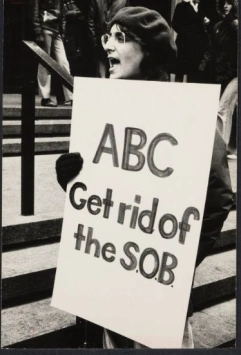
December 8, 1976 Protester
A group called the Women’s Anti-Rape Coalition was not so sympathetic. On December 9, the members organized a rally at ABC headquarters not only to demand that Tex be fired, but also to express outrage at Grimsby for his Storm Field remark. Spokeswoman Dorothy Glasse said, “We are concerned about a general insensitivity towards women at the station.” Ironically, as a result of the protest, WABC reported a further increase in support for Tex. The station said it received 140 calls, with most of them favoring Tex after seeing the story of the protest on the news.
On December 18, MacQueen announced that while they had lifted Tex’s work suspension, he would not be going back on the air. MacQueen said he could help Storm Field prepare his report. Field was a trained meteorologist and Antoine was not, so it’s hard to say what Antoine could do to help Field. Maybe if Tex had stayed with WNBC, and this was his 27th year with the station instead of only his tenth, the management might have expressed more loyalty. Despite all the comments by Tindigla, MacQueen, and O’Leary, that they would spare Tex’s job, WABC let him go on March 13, 1977, the same day his contract ran out.
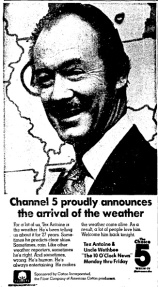
1978 Channel 5 Announcement
Last Years
In January 1978, WNEW Channel 5 gave Tex another chance. He was hired by the station with what at the time seemed to be great enthusiasm. Station Vice President Mark Monksy said, “Tex was once the best weatherman in New York and hoped he would be again. The man has been out of work for a year and that should be punishment enough.” But in only 10 months, Tex was let go again, replaced by former Miss New Jersey Linda Gialanella. After fending off the competition of weather girls throughout the 1960’s, he was in effect ultimately replaced by one. When asked what he would do with no job he said, “I don’t know. After 29 years where else can I go? I have no forecast for my future.”
The truth was Tex was losing his health. His ex-wife Ms. Glidden told me the diabetes condition worsened progressively during these years. She said he didn’t want to admit it, but he was not the same. Despite being only in his 50’s, disease and lifestyle had taken their toll. Tex did not make another public appearance and died on January 12, 1983, in his Park Avenue apartment of what was officially deemed to be natural causes.
Praise and Reflection
Bill Beutel spoke fondly of Tex at his funeral in 1983 and Ms. Glidden, now an avid active environmentalist and living in Westchester New York, only had kind words to say to me about Tex. He lived and loved broadcasting. For thousands of hours he was great on the air; he gave people the weather and made them laugh.
Tex was an inspiration to many aspiring 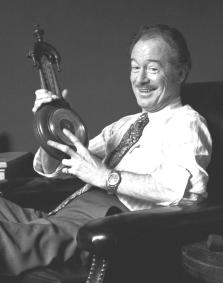 weather people who followed in his footsteps, and he was especially popular with children. Al Roker said he grew up playing with Uncle Weathbee Colorforms®. Area weatherman Bob Harris said instead of Chuck Berry and Elvis his idol was Tex. Author Robert Henson said his first source of weather reports was Antoine. For generations of New Yorkers, from the 1940’s to the 70’s, Tex was synonymous with weather. It’s unrealistic to think that the stigma of Tex’s bad joke will ever be completely forgotten, and his legacy will always pay a price. But in talking to those who knew him and looking back at his life, the professional, friendly, enthusiastic, and talented man who he was should not be forgotten either. (There are two scripted YouTube videos of Tex, which show him drawing, a Gaines Burgers commercial and a Bufferin Commercial.)
weather people who followed in his footsteps, and he was especially popular with children. Al Roker said he grew up playing with Uncle Weathbee Colorforms®. Area weatherman Bob Harris said instead of Chuck Berry and Elvis his idol was Tex. Author Robert Henson said his first source of weather reports was Antoine. For generations of New Yorkers, from the 1940’s to the 70’s, Tex was synonymous with weather. It’s unrealistic to think that the stigma of Tex’s bad joke will ever be completely forgotten, and his legacy will always pay a price. But in talking to those who knew him and looking back at his life, the professional, friendly, enthusiastic, and talented man who he was should not be forgotten either. (There are two scripted YouTube videos of Tex, which show him drawing, a Gaines Burgers commercial and a Bufferin Commercial.)
SOURCES
Articles
“Oral Husbandry, The Gentleman Likes To Be Called Mert and He Takes To the Air at 6:30 AM” (Jan 28, 1945) The New York Times
“Alias Uncle Wethbee” (November 1951) Radio TV Mirror
Jane Gerard “Weather Rain on Island Texan” (August 12, 1953) Newsday
“Television Weatherman Finds the Big Storm Had Him Snowed” (March 20, 1956) Newsday
Nancy Seely, “This Week on TV: Tex Antoine vs the Elements” (June 2, 1963) New York Post
“WCBS TV Decides To Drop Carol Reed and Weather Show” (May 29, 1964) The New York Times, p57
“Rainy Days Are for Weathermen” (October 4, 1964) The New York Times, pX17
“Weather Couple Engaged” (December 30, 1964) The New York Times
“Fund Drive Will Aid Diabetes” (May 6, 1964) Long Island Star Journal
“Suzannah C Glidden to Wed Tex Antoine” (July 19, 1965) The New York Times
Audrey Clinton “For Two Weeks It’s Been Fair and Blonde”(August 19, 1966) Newsday
Val Adams “Antoine to Quit WNBC for WABC after 17 Years” (February 8, 1966) p79
“Weatherbee Twists Dial Takes Sponsor” (Feb 8, 1966) Newsday p2c
Harry Waters, “The News With a Dash of Dirt” (January 25, 1970) The New York Times p93
Paul Klein, “Happy Talk Happy Profits” (June 28, 1971) New York Magazine p60
Dan Menaker, “Unfortunately Raindrops Keep Falling on Their Heads: TV Weatherman” (August 19, 1973) The New York Times, p 121
“TV Line” (November 11, 1973) Newsday
Marvin Kitman “Dirge for Obfuscation” (February 12, 1974) Newsday
“Events Pedal for Diabetes Fight” (May 2, 1975) Yonkers Herald Statesman
Barbara C. Chadwick, Bayshore, “Letters” (December 14, 1976) Newsday p53
Phillip Gedaly, Westbury “Letters” (January 5, 1977) Newsday p 61
“WABC Suspends Tex Antoine After a Flippant Remark on Rape” (November 25, 1976) The New York Times p45
“Tex Antoine to Return to ABC After Last Week’s Suspension” (November 29, 1976) The New York Times
Gerald Fraser, “Antoine Will Stay But Won’t Go On Air” (December 18, 1976) The New York Times
“Tex Antoine Returns to the Tube”, New York (December 12, 1977) 8
“Weatherman Tex Antoine Is Fired” (November 6, 1978) Newsday
“No Forecast for Antoine’s Future” (November 7,1978) Newsday 9QQ
Marvin Kitman, “Linda the Weatherperson” Newsday (August 13, 1979) A31
Glenn Garelick, “The Weather Peddlers” Discover (April 1985)p 24
Jerry Barmash, “Caching Up with Al Primo, the Man Behind Eyewitness News” (March 14, 2011) Adweek Magazine
Books
Robert Henson, 2010 Weather on the Air: A History of Broadcast Metereology
Ron Stokes, 2010 Mother Is Different and Other Family Secrets
Peter Conrad, 1982 The Medium and Its Manners
Photos
House Photo, Google Maps
Demonstration against Tex Antoine at ABC-TV, Bettye Lane, Harvard Univ Archive
1967 forecast, Ted David photo collection
1952 “Dodging The Dodgers” New York Post Photo By Con Edison p. 55
with barometer – celebritynetworths.org
Eric Barash
/ January 28, 2017Great Memories Here,
Thank You.
📺📻💽❤
michaelmoran425
/ January 28, 2017Our family always watched Tex and I do recall one occasion when he was clearly intoxicated on the air and couldn’t get his words out very well and poor Uncle Weathbee’s hat and umbrella were all askew – but it was the holidays and we felt it was in keeping with the spirits of the season
Bill Cotter
/ January 28, 2017Great story and well done. I knew Tex at WABC and it was a sad end to a great ride.
E.M. Bram
/ January 29, 2017I remember the scandal that ended his career. I didn’t know about the Grimsby remark. I also didn’t know Antoine wasn’t a trained meteorologist.
Gary Rae
/ January 30, 2017I remember watching and liking Tex as a kid in the ’60s. I also remember a “weather girl” by the name of Gloria Okon. My family used to watch both forecasts and then compare who was most accurate the following day. Tex usually won.
Richard Sloan
/ February 10, 2018Marvin Kitman wrote in his column that Tex ‘s utterance of “Get the f— out of the way so I can see the cake” (the day after it occured) was due to “one of those wrong mike errors.” You referred to it in your piece as the work of a rookie audio man who didn’t close the mike. Neither version is correct. You see, I was that audio man. First of all, I was not a rookie; I had been mixing the show for well over five years by then. (My tenure lasted 17 and a half years, at my own choosing.) And it wasn’t a mistake. The director told me that at the end of the show, a cake would be wheeled into the studio to mark Tex’s 25th anniversary as a TV weatherman, and that I should leave all the mikes open for chit chat and congratulations. What he didn’t tell me was that I should continue leaving the mikes open once I started to play the closing theme. So when I first started mixing in the music, he reminded me, “keep the mikes open.” I yelled back, “But they always think the mikes are closed when the theme is playing!” He insisted, “Keep ’em open!” I figured he must have cautioned the reporters that they would be open that night as they heard the music playing over the loud speaker. The rest was history. (By the way, it was reporter Doug, not “Ron” Johnson who was blocking a cameraman’s shot of the cake. The director took full responsibility in explaining to the boss what happened. I was really upset when Kitman’s column appeared the next day, but thought the wisest thing to do was to keep quiet rather than write to him and set the record straight. The director was a swell guy named Merle Bredwell, and I didn’t want to call any more attention to his poor judgement.
Todd Berkun
/ February 10, 2018Richard, any improvement on the accuracy of the story is welcome. Whether Tex thought the mike was supposed to be open or not I don’t think it was implied that it was wise on his part to say what he said. The focus of the story is about Tex, and that there were a few incidents before the one that has really haunted his legacy from the time he said it on. The story is bigger than one night on the air, or even a few other mistakes he may have made. He was an excellent in fact innovative weatherman, and while I in no way wanted to deny that his comment was horribly insensitive, for decades before he made it he was respected and beloved as a weatherman in the city.
W.B.
/ March 15, 2018From my recollections, Linda Gialanella did not directly replace Mr. Antoine at WNEW after he was let go in late 1978. For a few months afterward, the weatherperson was “Dr.” Bob Harris, before he was fired by them (and WCBS Newsradio 88) in early 1979 after a revelation that he was not a certified meteorologist and had faked his credentials. But within a year Harris picked himself up and landed the weather forecaster’s job at WPIX Channel 11 where he remained through much if not all of the ’80’s. It was after Harris’ firing from Channel 5 that Ms. Gialanella landed her spot. (Ironically, after leaving WNEW she had a spell at Tex’ old digs of WABC before entering into a long career doing the weather on Philadelphia TV.)
I also seem to remember Tex, in the early to mid 1970’s, doing an ad for Primatene, and I.I.N.M., it was filmed at the weather portion of the “Eyewitness News” set.
Todd Berkun
/ March 23, 2018Did Harris ever work at WNEW? Did he have a TV job before he started at WPIX. I doubt he ever worked at Channel 5 W.B. One of the strange things about wikipedia is that there are a lot of Bob Harris’s but no entry for Harris. It’s not as if he wasn’t a prominent personality before and after the 1979 incident. SInce there is no wikipedia page for the guy, I don’t know if he’s still alive or not. Is there any kind of a trail for Harris? If anyone has any contact info maybe they could let me or the blog know. Harris said he was an admirer of Antoine.
I Perkins
/ October 15, 2018I remember watching the news every night as child in NY. As far as my father was concerned, at 6pm, you watch the news or you watch nothing. I also remember watching it when Tex made the remark and Bill Beutel immediately apologized for Tex, saying that the phones lines were lit up. There were times when Tex was reporting the weather and he was lit too.
Video Vision
/ January 4, 2020Thank you for this thorough and well-researched profile of Tex Antoine. Until now, there’s been little of substance about him to be found anywhere on the Internet, and you’ve done an excellent job of filling in the gaps regarding biographical information about an important figure in broadcasting history who was, as I once heard Tex describe himself, “the man who basically invented TV weather forecasting.”
Todd Berkun
/ February 20, 2020Many thanks, it was a pleasure to research the piecee.
Todd Berkun
/ September 7, 2020This comment is via Richard Sloan, it is a response to my comment
Richard Sloan
September 6, 2020 at 5:36 pm
Todd Burken’s response to my comment is well taken. I just wanted to set the record straight that I didn’t have Tex’s mike open by mistake. I don’t want the error propagated, as is often the case with the internet. (By the way, the photo of Tex standing in front of a large map is misdated. It was 1976, when Al Primo took away Tex’s “Unkle Wethbee and his smock. And it was Roger Grimsby, not Bill Beutel, who reported the rape story. When Tex made his Confuscius remark, I watched the monitor for Roger’s off-the-air camera. He buried his face in his hands. He knew it would be the end of an illustrious career.
Tex was beloved by everyone. He had a great sense of humor and a great, long, deep throated dirty old man laugh. He did have his problems — the diabetes, the fondness for alcohol, and his sadness that his wife Suzanne had divorced him. (It was my understanding that he never got over it.) The stagehands kept a container of orange juice in their refrigerator to give him a sugar boost if he felt ill, especially in the summer time, due to the diabetes.) Deep down, Tex was a sad soul, and the staff of “Eyewitness News” knew of his suffering.